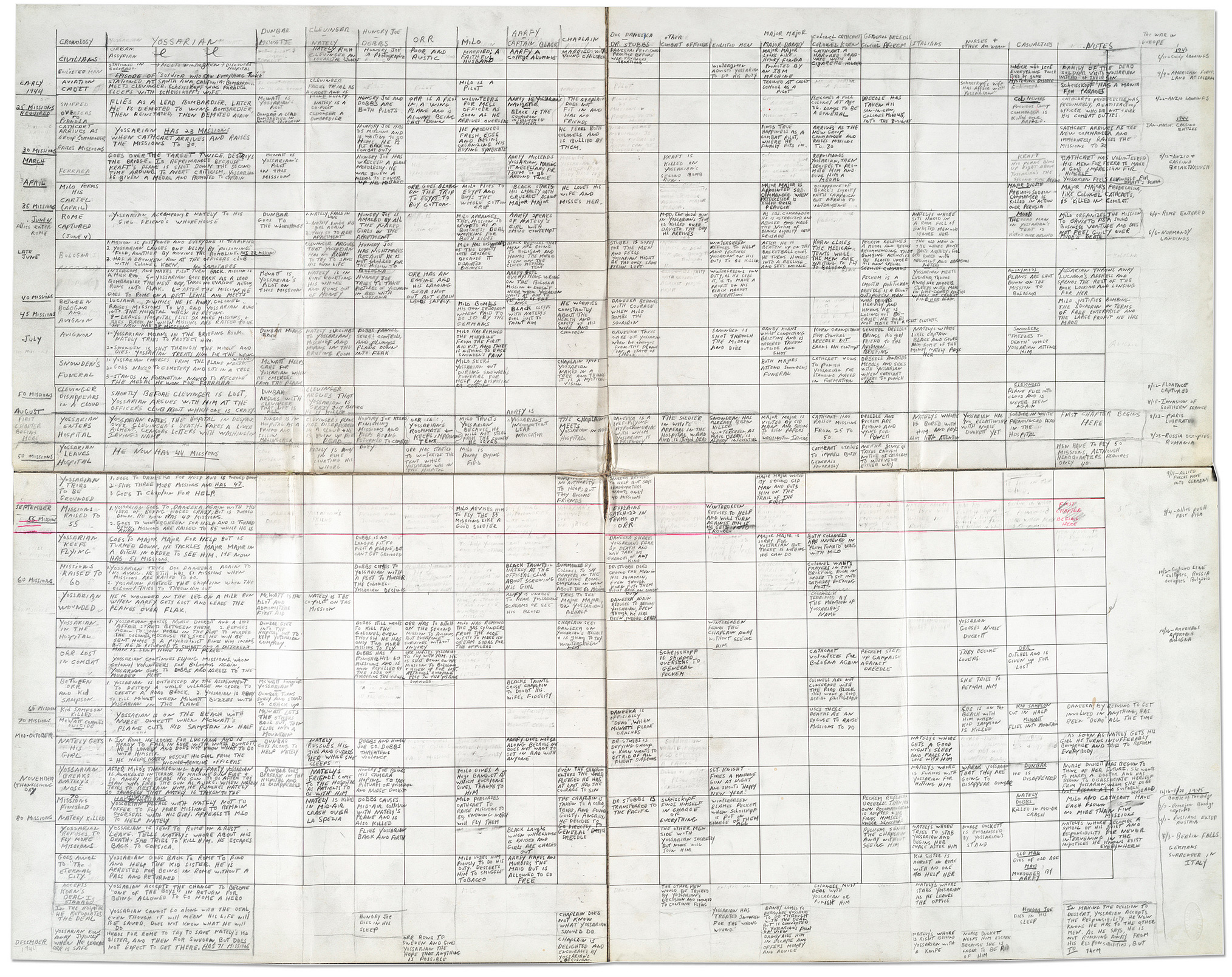"Who else will go?"
The above quote is perhaps the most succinct representation of the titular, much misused, catch that permeates Joseph Heller's Catch-22. Barely a paragraph goes by in which the characters are not confronted with another form of the famous logical paradox. The perfect contradiction of it comes to define practically every character's story arc, their interactions, their conversations and their very existence. All of this and more is why I have come to consider it my favourite book.
However, the novel's first line - "It was love at first sight" - doesn't quite reflect my relationship with it. On the first reading, the plot is so brutally complex and non-linear that it isn't until beyond the halfway point that the reader can begin to piece together what actually happens, and when. Indeed, to attempt to explain it here would require more words than the book itself, so here's a drawing by Heller himself:
Much better.
In fact, this was my fourth time taking this particular ride, and I was surprised at how much of the plot was just second nature to me. This allowed me to appreciate the little allusions and connections throughout the book that link the episodic chapters to one another, ensuring it is so much more than just a collection of short stories.
And yet the chapters, especially the longer among them, serve perfectly well as stories on their own. The story of Milo Minderbinder and his preemptive forays into the post-war globalist world of trading, in particular, would work brilliantly as a film, as would perhaps the earliest moments in the work's timeline in which Yossarian is subjected to the absurdity of basic training, the ever present threat of actual combat hanging over him and concluding in the incident that drives his perspective for most of the book.
Countless words have already been written about the catch-22 concept and its logical and philosophical connotations; about Heller's (decidedly negative) portrayal of war and his use thereof as an analogy for the wider world; about the criticisms that are levelled at the contemporary society of the 1960s under this guise. Still more have been written about the use of language in the book, how it reflects the catch scenario in itself, and how the threads of narrative weave together to form a cohesive whole. I doubt that I will be able to add much to any of this, other than that these are all parts of what make it such a masterpiece in my opinion.
Instead, what struck me most this time around was the work's sensitivity. Hiding among all the absurdity of the dialogue are some outstanding soliloquies on the intransigence of life and the inevitability of death. The scene where Yossarian is made to pose as an airman already killed in battle in order to provide closure to his family who have come to visit him on his deathbed stood out as particularly poignant, but there are several similar moments where the action slows down a touch to provide similar hubris. A number of characters become, even with all the madness that surrounds them and which they seem to willingly perpetuate, tragic figures at the mercy of forces beyond their control.
The final quarter of the narrative in particular becomes almost relentlessly pessimistic, until the final scene which brings together all the hints and allusions at a possible solution that have been building up to that point. It wraps up the book as a whole in a way that is - and I don't use this word lightly - nothing short of genius.
This a book that everyone should read, and then read again. I for one anticipate getting through it many more times in my life, and I genuinely expect to take away something new each time.
5/5, obviously.
It seems fitting that my favourite book should go hand in hand with my (current) favourite song - Outkast's Southernplayalisticadillacmuzik. The album by the same name actually has a few things in common with Catch-22, namely the way in which threads of themes mesh together throughout to form a whole that is greater than the sum of its parts, but at the same time those parts somehow work better on their own. In itself that's a catch-22 scenario...

No comments:
Post a Comment